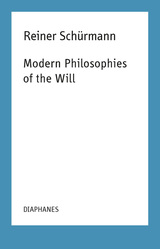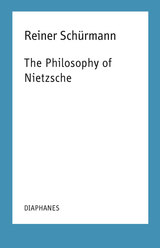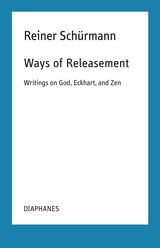4 books about Guercio, Francesco

Heidegger's De(con)struction of Metaphysics
Reiner Schürmann
Diaphanes, 2021
In Being and Time, Heidegger announced the “Task of Destroying the History of Ontology” in order to free what had remained “unthought” in Western metaphysics. The unpublished part of that work was to be titled “Basic Features of a Phenomenological Destruction of the History of Ontology. According to the Guiding Thread of the Problem of Temporality.” This latest work in the Reiner Schürmann Selected Writings and Lecture Notes series aims to carry out Heidegger’s plan. The destruction, or, as it is later called, the deconstruction of metaphysics, has a negative side—the peeling off, or the archeology, of metaphysical history by means of the guiding thread of the question of Being—and a positive side—“retrieval” of the original experience of Being in ancient Greek philosophy.
“The destruction has no other intent than to win back the original experience of metaphysics through a deconstruction of those conceptions which have become current and empty.” The purpose of taking to pieces the fabric of Western metaphysics is to show how at each important stage “the question of the meaning of Being has not only remained unattended to or inadequately raised, but that it has become quite forgotten in spite of all our interest in 'metaphysics'.”
“The destruction has no other intent than to win back the original experience of metaphysics through a deconstruction of those conceptions which have become current and empty.” The purpose of taking to pieces the fabric of Western metaphysics is to show how at each important stage “the question of the meaning of Being has not only remained unattended to or inadequately raised, but that it has become quite forgotten in spite of all our interest in 'metaphysics'.”
[more]

Modern Philosophies of the Will
Reiner Schürmann
Diaphanes, 2020
Through the lenses of Kant, Nietzsche, and Heidegger, this edited volume traces the development of the relation between the will and the law as self-given. Modern Philosophies of the Will explores a variety of topics including: the ontological turn in philosophy of the will; the will’s playful character and the problem of teleology; the will as principle of morality as discussed by Kant, of lifeforms as discussed by Nietzsche, and of technology as discussed by Heidegger; the formal identity of legislation; and transgression of the law. This volume traces three strategies in the development of the philosophy of will from Kant to Heidegger, through rationality and irrationality of the will, the ontological turn, and law.
[more]

The Philosophy of Nietzsche
Reiner Schürmann Lecture Notes
Reiner Schürmann
Diaphanes, 2018
Nietzsche praised Kant for having “annihilated Socratism,” for exhibiting all ideals as essentially unattainable, and for having exposed himself to the despair of truth—all essential traits Nietzsche claimed for his own thinking. At the same time, the existentialist philosopher remained highly critical of Kant.
This volume of Reiner Schürmann’s lectures unpacks Nietzsche’s ambivalence towards Kant, in particular positioning Nietzsche’s claim to have brought an end to German idealism against the backdrop of the Kantian transcendental-critical tradition. Rather than simply compare the two philosophers, Schürmann’s lectures help us to understand the consequences Nietzsche derived from Kantian concepts, as well as the wider horizon within which Nietzsche’s ideas arose and can best be shown to apply. According to Schürmann’s trenchant reading: if Nietzsche was indeed “fatal” to Western philosophy, as he claimed, he was so in large part because of the Kantian transcendental thinking from which he inherited the very elements and tools of his criticism.
This volume of Reiner Schürmann’s lectures unpacks Nietzsche’s ambivalence towards Kant, in particular positioning Nietzsche’s claim to have brought an end to German idealism against the backdrop of the Kantian transcendental-critical tradition. Rather than simply compare the two philosophers, Schürmann’s lectures help us to understand the consequences Nietzsche derived from Kantian concepts, as well as the wider horizon within which Nietzsche’s ideas arose and can best be shown to apply. According to Schürmann’s trenchant reading: if Nietzsche was indeed “fatal” to Western philosophy, as he claimed, he was so in large part because of the Kantian transcendental thinking from which he inherited the very elements and tools of his criticism.
[more]

Ways of Releasement
Writings on God, Eckhart, and Zen
Reiner Schürmann
Diaphanes, 2023
Never-before-published writing from a key twentieth-century philosopher.
In 1962, Reiner Schürmann began studying at the Dominican school of theology Le Saulchoir, outside Paris. That experience radically shaped his life and work, enabling him to begin to develop many of the ideas for which he would later be known: letting be, life without why, ontological anarchy, and the tragic double bind.
Ways of Releasement contains never-before-published material from Schürmann’s early period as well as a report Schürmann wrote about his encounter with Heidegger; a précis of his autobiographical novel, Origins; and translations and new editions of later groundbreaking essays. Ways of Releasement concludes with an extensive afterword setting Schürmann’s writings in the context of his thinking and life.
In 1962, Reiner Schürmann began studying at the Dominican school of theology Le Saulchoir, outside Paris. That experience radically shaped his life and work, enabling him to begin to develop many of the ideas for which he would later be known: letting be, life without why, ontological anarchy, and the tragic double bind.
Ways of Releasement contains never-before-published material from Schürmann’s early period as well as a report Schürmann wrote about his encounter with Heidegger; a précis of his autobiographical novel, Origins; and translations and new editions of later groundbreaking essays. Ways of Releasement concludes with an extensive afterword setting Schürmann’s writings in the context of his thinking and life.
[more]
READERS
Browse our collection.
PUBLISHERS
See BiblioVault's publisher services.
STUDENT SERVICES
Files for college accessibility offices.
UChicago Accessibility Resources
home | accessibility | search | about | contact us
BiblioVault ® 2001 - 2024
The University of Chicago Press









